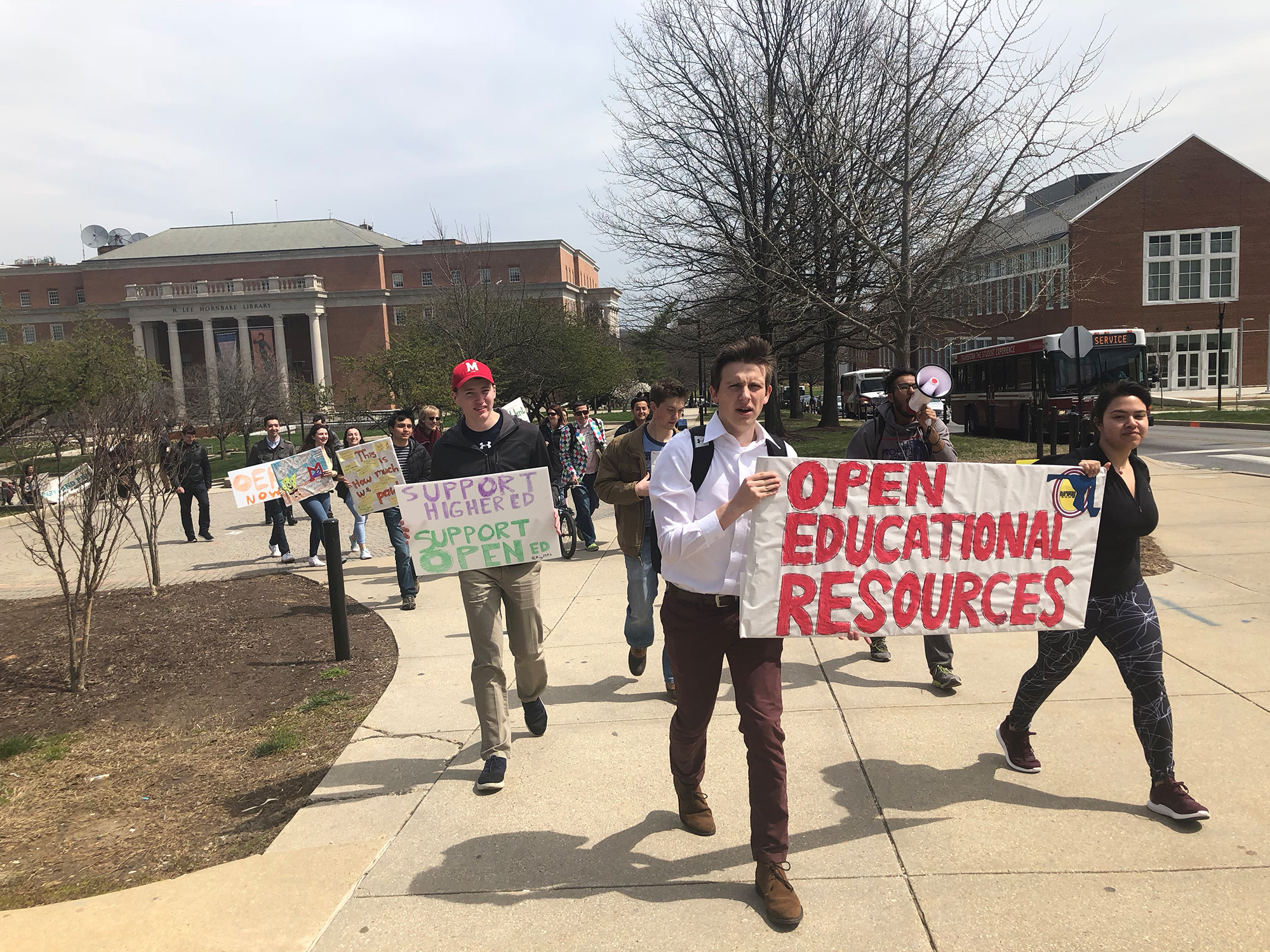“Open source, open learning!” chanted a crowd of University of Maryland students as they marched from Hornbake Plaza to McKeldin Mall on Friday to promote textbook affordability and raise awareness about open-source educational alternatives.
MaryPIRG, an on-campus student activist group, organized the march to urge the administration to offer more open educational resources, or OERs, as an alternative to traditional textbooks, said Gaurav Dahal, the march’s organizer and the group’s textbook initiative coordinator.
OERs are open-source educational materials — such as textbooks and scholarly journals — that are openly licensed and cost-free.
About 25 marchers trekked in the hour-long demonstration, hoisting signs that read “SUPPORT HIGHER ED, SUPPORT OPEN ED” and “Do U Want to LOHer Textbook Prices.”
[Read more: MaryPIRG staff organizers may be able to apply for salaries, thanks to an SGA referendum]
Dahal, a sophomore biology and chemistry major, said he hopes the march will show the administration that students are concerned about rising textbook costs.
The average cost of textbooks and supplies during the 2017-18 academic year ranges from $1,220 to $1,420, according to College Board’s Annual Survey of Colleges.
“I wanted to give a platform for students where they could have their voices and concerns heard. It’s a great way for the administration to know that students care,” Dahal said.
Dahal emailed university President Wallace Loh’s office and Vice President of Student Affairs Linda Clement on April 3 to ask them to support MaryPIRG’s textbook affordability initiative, he wrote in a message, but did not receive a response. Administrative officials did not acknowledge the march when it stopped at the Main Administration Building on Friday.
Anmol Basnet, a sophomore information science major who attended the march, said his PSYC100 course has an online textbook, but he would like to see open-source textbooks replace traditional textbooks across the university.
“Textbooks are ridiculously high-priced, like what the hell?” Basnet said, who was holding a sign that read “TUITION + $500 TEXTBOOKS = RIDICULOUS.”
Christian Coello came to the march to convince the administration that textbook affordability is an issue students care about, the sophomore computer engineering major said as the group approached the Main Administration Building.
“We pay too much for everything,” Coello said. “So, anything we can do to reduce [textbook] prices is a good thing.”
After the stop at administration, marchers streamed toward the mall as Dahal led more chants with a megaphone. “Hey hey, ho ho, textbook prices have to go!” the crowd chanted.
“Affordable textbooks are a really worthy cause,” said Chris Richter, a junior finance and government and politics major. Richter attended the event because he knows how expensive books can be, adding that some of his business textbooks can cost as much as $150 each, he said.
Textbook prices almost tripled over an almost 20-year period until 2016, according to a conservative public policy think tank called the American Enterprise Institute.
The march is a way to inform professors about the alternatives like OER that are available to them, said MaryPIRG President Ary Papadopoulos.
[Read more: MaryPIRG is supporting easier voter registration as part of its democracy campaign]
“Some professors aren’t even aware that they can apply for grant money for adapting open-education resources into their classroom,” said Papadopoulos, a senior public health science major. “If they don’t know about this program, then how can we expect them to utilize it?”
Since 2013, the University System of Maryland and Kirwan Center for Academic Innovation — a center that seeks to improve higher education in Maryland — have offered the Maryland Open Source Textbook initiative, which offers OER alternatives to professors, said MJ Bishop, the Kirwan Center’s director.
University Libraries plans to offer a pilot program this fall that awards two $1,000 grants to university faculty to integrate open-source materials into their courses, said Gary White, this university’s associate dean of public services.
White hopes to expand the grant program after next year as more faculty adopt open-source alternatives.
“I don’t think it’s fair for only students to be advocating for [open-source textbooks]. I think the administration needs to put their hands in and do something about it,” Dahal said.



